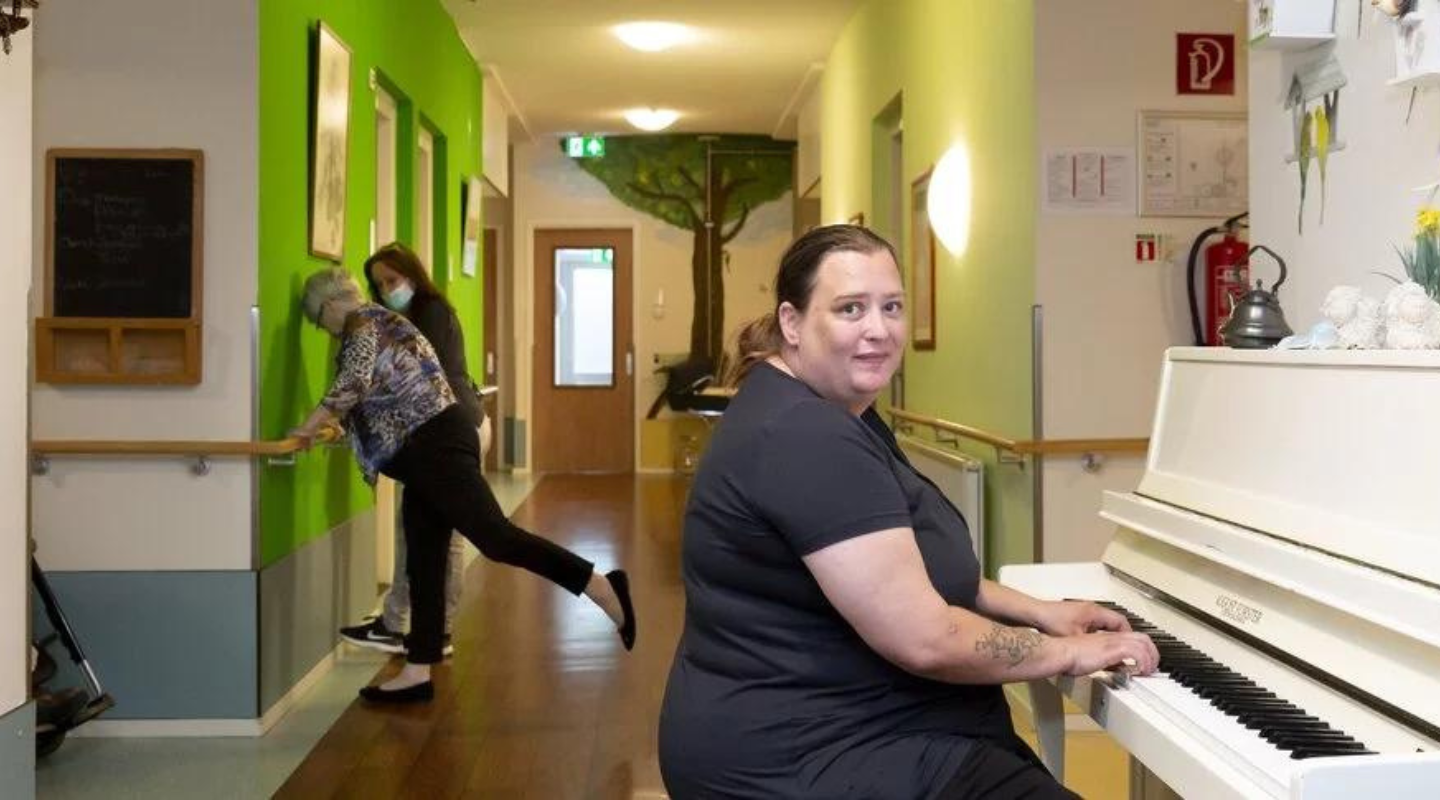Singing and making music together in a nursing home

Nothing creates a mood like music, even in a nursing home. Petra Baarsma, care director at De Waalburcht nursing home in the centre of Papendrecht, explains the important role music plays for residents with dementia.
In the living room of De Kasteeltuin residential group, three residents eat fruit at the dining table. In the corner of the room, a TV is on with soothing ambient music. “The music creates a relaxed atmosphere during dinner,” says Petra Baarsma. “This is one example of how we use music.”
De Waalburcht, part of Rivas Care Group, follows Planetree principles: ‘person-centred care’ where the focus is not on the illness, but on the needs of the residents. Together with a colleague, Baarsma is responsible for 16 residents with dementia. This psychogeriatric residential group is one of five sections within De Waalburcht nursing home. As well as administrative duties, Baarsma also works with the residents and at the bedside.
Nederland Zingt and the Urker Male Voice Choir
Residents at De Kasteeltuin have a regular daily structure, tailored to their own rhythms and wishes. Baarsma: “When people come to live here, we ask extensive questions about their life history. We discover what their habits are and what they like and don’t like so we can provide the right care. We might set up a church service in one living room on Sunday mornings and Nederland Zingt or the Urker Male Choir in another. If residents want to, they can also help fold laundry or clean the windows.”
Singing along with The Beatles
Music plays an important role and there is a lot of singing at De Kasteeltuin. People with dementia often clearly remember the songs from their childhood. Live music is also very popular with the residents. Willeke Alberti has performed twice, and so has Wieteke van Dordt, along with and several local choirs and singing groups. The Papendrecht choir rehearses in the restaurant between meals and at Christmas there is a man playing old Christmas songs with a hand organ.
"You assess what stage of dementia someone is at," Baarsma explains. "If someone is at the early stages of dementia, you don't sing them children's songs. But you might at a later stage. These are pretty much the same songs that we also know: Mary Had a Little Lamb or Pat-a-Cake. This makes for a very friendly atmosphere. We find that the residents also like more modern music, such as The Beatles or The Doors. One lady, for instance, sings along to Beatles songs at the top of her voice. One day, I was working on my computer and had The Beatles on. And she stood next to me and danced. Five minutes later, there was a disco of dancing residents next to my desk."
Music also helps employees
Music also helps the healthcare providers in their work, especially when a resident is advanced in their dementia and can’t really communicate.
"They don’t understand that you want to look after them and may act defensively when you try to get them dressed or washed. If I know that they love classical music, then I'll put it on. The resident starts to relax, and I can get them ready more easily. Or consider the resident who stays in bed for a long time. A family might give us music to play to encourage the resident to wake up and help us get them out of bed."
Hymns have deep effect on residents
The depth to which music can touch residents is especially evident in religious music. Baarsma: “People of faith are deeply affected by that. Sometimes we sing hymns. This creates a serene atmosphere, very different to children’s songs. One lady could no longer speak due to her dementia. When I sang a song from our church, a tear rolled out of the corner of her eye. I knew I was still able to reach her.”